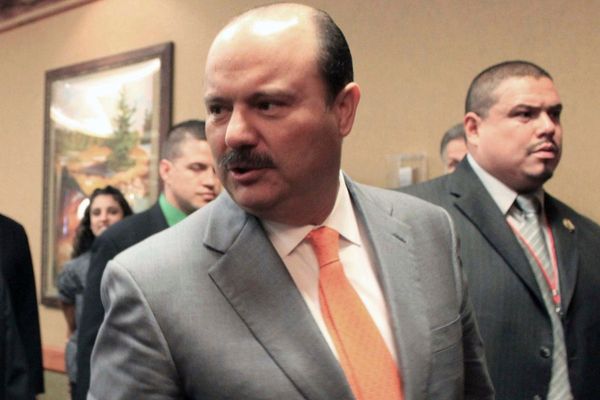Former President Trump was facing a Monday deadline to post a $464 million bond in his New York civil fraud case when a New York appeals court agreed to slash it by nearly $300 million.
Why it matters: The appeals court also extended by 10 days Trump's deadline to post the reduced $175 million bond. The temporary reprieve staved off a worst-case scenario for the likely 2024 GOP presidential nominee.
- Before the appeals court ruling, failure to post the bond by the Monday deadline could have led New York Attorney General Letitia James to freeze Trump's bank accounts or move to seize assets from his real estate portfolio to cover the judgment.
What does this indicate about Trump's finances?
Trump's lawyers said last week that securing the $464 million bond had been "impossible" after they approached more than two dozen companies and none were willing to cover the amount.
- More than 30 bond companies turned down his lawyers' requests to guarantee the bond, the New York Times reported.
State of play: No company would accept his real estate as collateral and would only accept cash or cash equivalents, his lawyers said.
- His inability to secure a bond under those terms at the very least suggests he lacks access to a large amount of liquid assets.
- This may in part be because he posted a nearly $92 million bond earlier this month to appeal the $83.3 million in damages he was ordered to pay writer E. Jean Carroll for defamation by denying her sexual assault allegations.
- Trump said on Truth Social last week that he has almost $500 million in cash, a "substantial amount" of which he had intended to use on his presidential campaign.
- Trump's lawyers have claimed that to secure a bond he would have to put forth about 120% of the judgement — more than $557 million, per AP.
Reality check: Much of Trump's wealth is tied up in real estate.
- His lawyers have also argued that in order to come up with the necessary cash Trump would be forced to sell his properties as a loss, per the New York Times.
What is a bond?
In this case, it's a guarantee that the money for the damages will be available in case Trump's appeals ultimately fail.
- Typically, a defendant hoping to appeal legal damages will approach companies to post the bond on its behalf in exchange for a fee that's a percentage of the total bond amount.
- The bond is usually covered by cash or other liquid assets presented by the defendant as collateral. Real estate is rarely accepted as collateral because of the lengthy appraisal process and its value being influenced by market fluctuations.
- The bond allows defendants to exhaust their legal options while protecting the court from frivolous appeals. It also shields plaintiffs from dishonest tactics to delay payment and from the defendant's financial situation.
What's next: If the appeals fail, the defendant will be required to pay the judgment. If they can't, the plaintiff may collect the damages from the bond company and the defendant would be required to reimburse the company.
- If a defendant wins the appeal and the damages are overturned or reduced, the company still retains the fee.
Why is Trump's appeal amount so high?
Trump's bond is nearly half a billion dollars because he was ordered to pay nearly that amount in damages and interest after being found liable for financial fraud for falsifying business records.
- New York law requires defendants in civil cases to post a bond worth at least 110% of the judgment amount to delay paying the penalty as they appeal.
- Since Trump is on the hook for $454 million in the civil fraud lawsuit, his appeal bond was originally set at $464 million.
What they're saying: Trump's lawyers said securing that is a "practical impossibility" because only a very few companies would accept a bond of that amount.
- The only ones that would accept the bond require collateral worth approximately $557 million in the form of cash or cash equivalents and would charge nearly $20 million in fees, his lawyers said.
What happens if Trump can't pay?
James could have started collecting on the damages after the judgment was imposed, but she gave Trump and his co-defendants a 30-day grace period to arrange a bond or prepare to pay the judgment.
Zoom in: James took a first step toward seizing Trump's properties by filing judgements on March 6 in Westchester County, according to the county clerk's online database.
- It suggests James may seek to seize and sell the Trump National Golf Club Westchester or his Seven Springs private estate north of Manhattan to help fulfill the judgement
- James has said she would seize Trump's properties if he can't pay, though actually doing so could be politically contentious.
- It would also be legally complex given the tangled structure and financing used by his businesses.
Eric Trump, a co-defendant in the case, railed against the bond and James in a Fox News interview on Sunday.
- "They're trying to deprive him of his cash, they want to bankrupt him, they want to hurt him so badly," Eric Trump said of his father.
Can Trump declare bankruptcy to avoid paying?
Trump could have the businesses implicated in the case declare bankruptcy.
- It would prevent James from collecting but would significantly damage his reputation and could ignite more litigation over corporate debts.
Context: Considering some of Trump's companies had a string of bankruptcies in the 1990s and early 2000s that nearly financially ruined him, it's unlikely his companies will file for bankruptcy again.
Can Trump use campaign donations to pay the bond?
While Trump campaign fundraising committees have started using the bond deadline and the potential property seizures in donation requests, it won't help with the bond or judgement.
- One appeal to supporters said, "Keep your filthy hands off of Trump Tower," in response to James' threat to seize Trump's properties to pay the judgment.
- The Federal Elections Commission allows certain campaign funds to be used to pay for legal expenses, but using funds to pay a bond or a judgement would likely violate campaign finance laws.
Go deeper: Jewish lawmakers rage at Trump's "revolting" comments
Editor's note: This story was updated with new developments.







